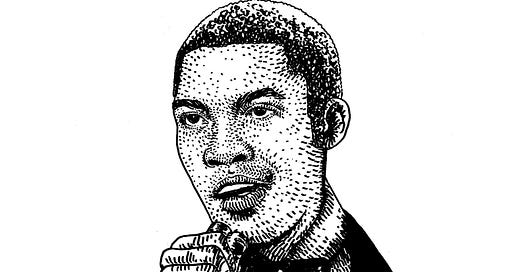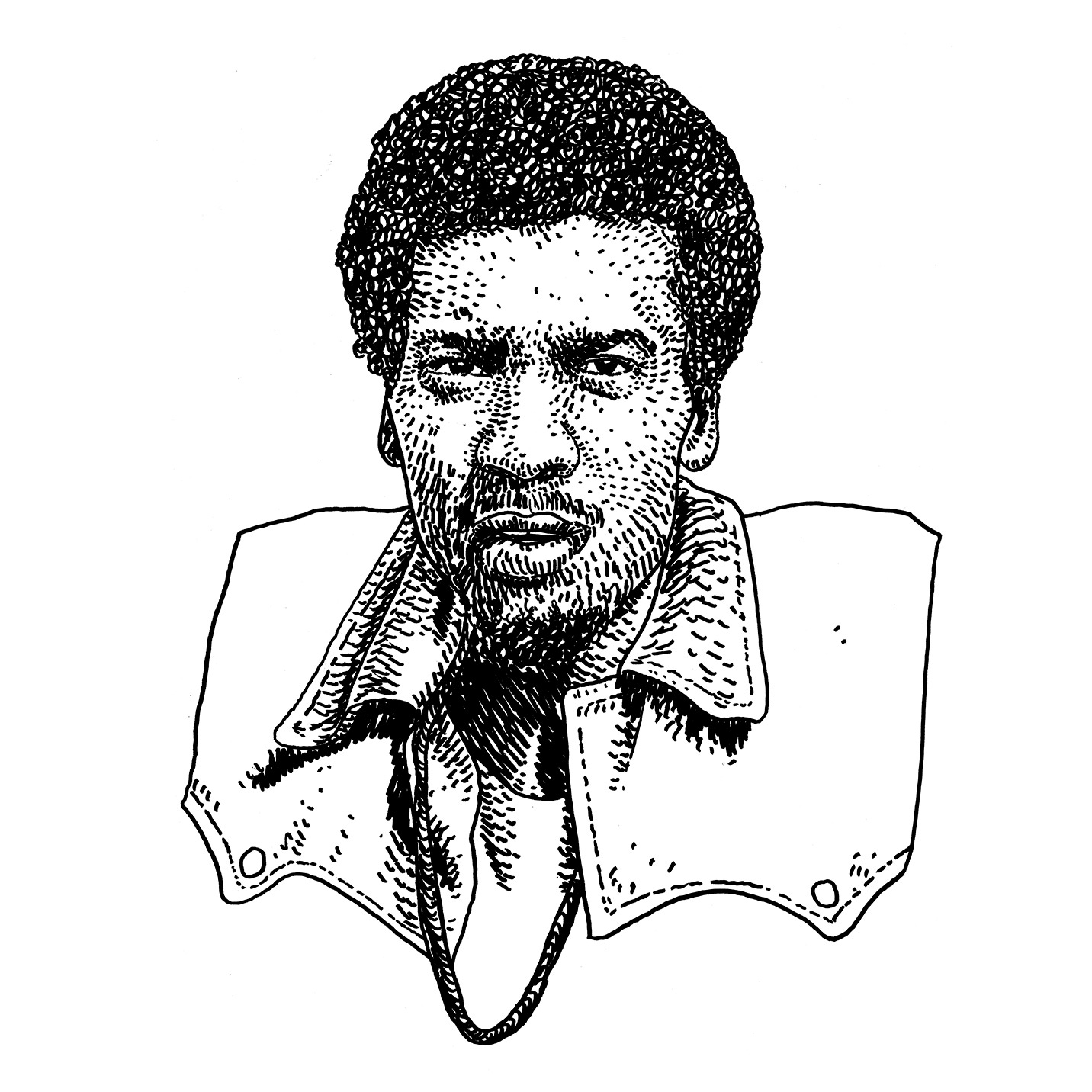Hello, and welcome to the inaugural post of my newsletter, where I’ll be reviewing portraits and biographies from my 365 Musicians series, and eventually, my 366 Musicians series. In between the words and pictures, I’ll be curating some relevant videos and a Spotify playlist so you can familiarize yourself with each week’s artists.
If you like what you see, you can subscribe, and possibly forward to a friend that might enjoy. It’s free!
This week I’ll be tackling the very first subjects of The Musicians Series—the rudest of the rudeboys, trailblazers and pioneers of ska from Jamaica.
Desmond Dekker
Desmond Dekker worked as a tailor and a welder in Jamaica before his audition for Leslie Kong landed him a record deal. He brought another singing welder to Kong's attention—a young Bob Marley.
His song 007 (Shanty Town) made him a rudeboy icon. Israelites, his song about Rastafarianism and rudeboys, was the first UK reggae number one hit. Paul McCartney named the character in Ob-La-Di, Ob-La-Da after Desmond.
After Kong's death, Dekker signed to Stiff Records. His 1981 album Compass Point was produced by Robert Palmer. He collaborated with The Specials on the 1993 album King of Kings. Dekker died from a heart attack at his home in Croydon in 2006.
Desmond live at the Beeb.
Don Drummond
Don Drummond was a trombone player and songwriter for The Skatalites. While attending the Alpha Boys School, he taught his friend Rico Rodriguez how to play trombone. His conversion to the Rastafarian movement prompted his bandmates to follow his lead.
Drummond was one of the most prolific composers of the ska scene, having written over three hundred songs. He began suffering from mental health issues, and was convicted of murdering his girlfriend, rhumba dancer Marguerite Mahfood, in 1965. He was ruled criminally insane, and died in the Bellevue Asylum in Kingston four years later.
The cause of his death is contested, with the official reason (depending on the source) being listed as suicide or natural causes—possibly heart failure, malnutrition, or improper medication. Some believe he was killed as part of a government plot against the Jamaican music scene, and others claim he was murdered by gangsters for revenge.
Laurel Aitken
Laurel Aitken was a Cuban born singer who first found success in Jamaica as a mento singer before he was known as the Godfather of Ska. He cut the first single for producer Chris Blackwell's Island Records—1958's Little Sheila / Boogie in my Bones.
In 1970 he moved to the UK and was an elder statesman of 2 Tone, with a solid fan base of mods, skinheads, and English rudeboys. The (English) Beat based their song Ranking Full Stop on Aitken's Pussy Price, and UB40's Tiger was a remake of his song Guilty.
Aitken was in Absolute Beginners, alongside David Bowie. There is a blue plaque on his Leicester home.
Here’s a video of Laurel performing Sally Brown with The Loafers in 1989, the salad days of third wave.
Prince Buster
Before the world knew him as Prince Buster, Cecil Bustamente Campbell grew up on Orange Street. His middle name was given to him to honor the first Prime Minister of an independent Jamaica. He was a boxer when he started working security for Coxsone Dodd, eventually becoming a selector for his sound system
Prince Buster left to start his own sound system, Voice of the People. He tried to go to the US on a work visa, in an attempt to collect records to deejay, but was denied entry at the last minute. This led him to record his own music.
Prince Buster was a pioneer of ska, and one of the first to sing about rudeboys. His song Oh Carolina was the first to feature Niyabinghi drumming. He went to the Wareika Hills and recruited Count Ossie's Afro-Combo to play on the song, giving exposure to Rastafarians, who were marginalized in Jamaican society at the time. He met Muhammad Ali in 1964, and soon after, converted to Islam. The Prince was hugely influential on Two Tone, eliciting numerous covers from Madness, The Specials, and The Beat.
Here’s a fierce outbreak of ska, followed by an older illustration I did when the Prince died.
Alton Ellis
Alton Ellis was known as the Godfather of Rocksteady. Ellis' first two records are considered definitive classics in the genre. He was a low key huge influence on other genres, as well. The riddim from his 1968 track Mad Mad was re-recorded by Henry Junjo Lawes and became known as the Diseases riddim.
The Diseases riddim has been sampled by many artists, including KRS-One, Biggie, Pac, Sublime, and most notably, in Yellowman's Zungguzungguguzungguzeng.
Before John Holt was in The Paragons, he and Ellis were a duo. Alton often recorded with his sister, Hortense. He had over twenty kids, and two of his nephews are comedians.
Here’s a nice mix with a lot of songs that use the Mad Mad / Diseases riddim.
Jimmy Cliff
Jimmy Cliff starred in The Harder They Come, a film that captured what the Jamaican music scene was like in 1972 and helped bring reggae to the world. He was also in the films Club Paradise, and Marked for Death. He holds the Order of Merit, the highest honor granted by the Jamaican government for the arts.
Bob Dylan called Jimmy's Vietnam the best protest song he'd ever heard. The Sandinistas used You Can Get It If You Really Want as their 1990 campaign anthem. The same song was also used by the British Conservative Party in 2009. He worked on Sun City with Steven Van Zandt, and sang backing vocals on The Rolling Stones' Dirty Work. Jimmy's 2011 EP, The Sacred Fire, was produced by Rancid’s Tim Armstrong.
The trailer for The Harder They Come—if you’ve never seen the film, you should definitely make it a priority.
Toots Hibbert
Toots Hibbert served 18 months in prison for marijuana possession. His time inside inspired his song 54-46 That's My Number. The Toots and the Maytals 1968 single, Do the Reggay, was the first song to use the word reggae, thus naming the genre. Pressure Drop is literally about the weather, but metaphorically about karma.
He was raised an Evangelical Christian, and often wrote of occult and religious practices in his songs, referencing Rastafarian themes, obeah folk magic, and the Sixth and Seventh Books of Moses. Toots and the Maytals performed on SNL the first time Donald Trump hosted.
Furthermore
Here’s a BBC doc by former Clash videographer / Big Audio Dynamite founder / all around legend Don Letts that serves as a great starting point for learning about the many subcultures that fall under the umbrella term SKINHEAD.
Aaaand here’s a Spotify playlist with some featured artists, and some bands they influenced.
Thanks for reading! And seriously—if you enjoyed it, please subscribe and forward this to somebody who thinks like you.










